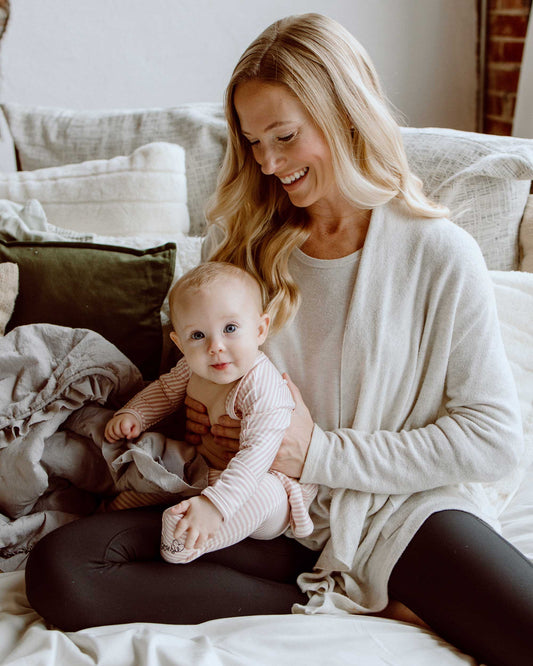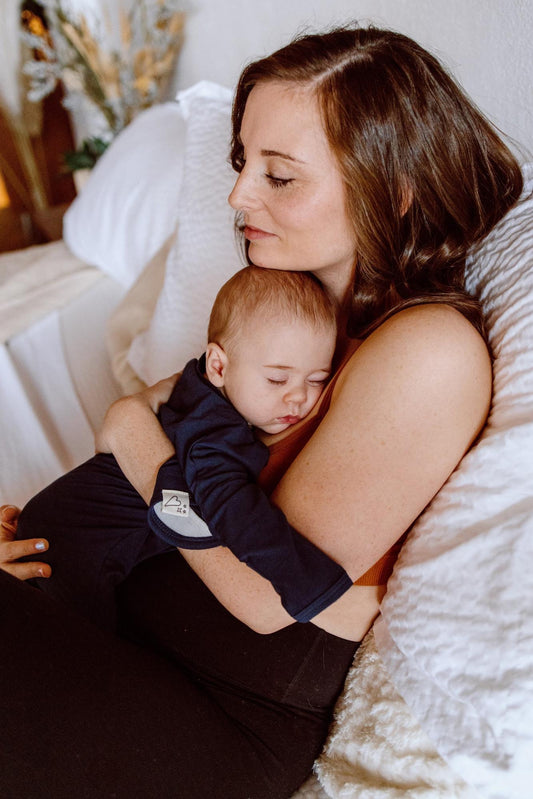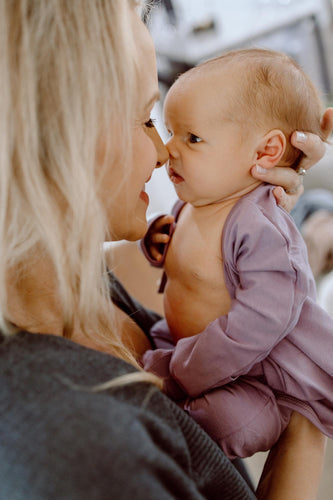Share
One in Amelia: A NICU Story
Pranav JhadavThis month, we are dedicated to raising awareness about the challenges and bravery of our tiniest, most vulnerable citizens-—the infants in Neonatal Intensive Care Units, plus their devoted families and the heroic medical team who care for them.
According to Health Care Cost Institute, In 2021, 18% of babies born in a hospital in the U.S. required NICU care; this is an 8% increase of NICU babies since 2017. Given the tremendous strain that the NICU places on families, financially, emotionally and physically, this concerning statistic highlights a growing need for education, resources, and support.
At Bonsie, our mission is to empower parents with knowledge about the transformative benefits of skin-to-skin contact, particularly for babies in the NICU due to prematurity or medical concerns. Our babywear is thoughtfully designed to facilitate this vital practice, both in and out of the NICU, while also accommodating the attachment of medical equipment with ease. We create babywear with a purpose: to make skin-to-skin contact as seamless and accessible as possible.
According to Cleveland Clinic, skin-to-skin contact, also known as Kangaroo Care, offers numerous benefits, especially for babies who are in the NICU. Extensive research proves that this practice can significantly stabilize a baby's heart rate and improve their breathing pattern, making it more regular. Additionally, skin-to-skin contact supports healthy sleep by promoting more quiet sleep and longer sleep cycles, which are crucial for a baby’s development.
This type of care is also associated with encouraging a baby’s growth and relieving pain during medical procedures, such as the heel prick tests. (Remember, if medically possible, you can request that you hold your baby during tests like this to soothe discomfort.) Furthermore, it has been shown to lower the risk of hypothermia, serious infections, and even death. As soon as NICU babies are medically able to be held, skin-to-skin with their parents is the best place for them to be.
If a baby can’t be held yet, even holding their tiny hand has a huge effect on their health. This speaks volumes of the importance of touch and connection.
Beyond the benefits for the baby, skin-to-skin contact plays an essential role in helping parents bond with their newborn. It can also assist in establishing breastfeeding, often leading to an increase in milk supply. For parents, this close contact can boost confidence in their ability to care for their baby and respond effectively to their needs.
Understanding the critical importance of this bonding experience for NICU babies, we are grateful to share inspiring stories that highlight the profound impact of this practice on families and their little ones.
Caroline and Amelia have a beautiful and unique story to share about their time in the NICU and the impact of that experience. If you are a NICU parent or know someone who is, please read this! It’s the inspiration we all need.
Amelia spent one week in the NICU, and in the one year since her NICU stay, has had 30 overnight stays in Children’s Mercy Hospital, averages 6-10 doctor appointments a week, and has a full-time nurse. Caroline, Amelia, and her family are no strangers to hospitals, specialists, and medical equipment. However, amidst every challenge, Caroline feels endlessly grateful that she gets to be the mom of her special, smiley little girl.
Like so many moms across the world, Caroline did not get to experience The Golden Hour. After an emergency c-section at 37 weeks, Amelia was immediately rushed to NICU because she was experiencing significant breathing difficulties. Caroline has left space in her heart for mourning the moments that she missed with Amelia, but she has left much more space for a determined, positive mindset while she remains in awe of her little fighter.

Amelia, 3 months old.
“It was definitely really hard because when I knew I was having a c-section, I thought, I'm going to hold her and get that photo of that moment and have skin-to-skin. Well, I didn’t get that, and it still makes me super sad. But even though I didn't get that moment, I do not feel any less connected to her or in sync with her than I do my two sons, who did get that time. There were so many things that were different: I didn’t get to hold her right away, I didn’t breastfeed her, and she eats through a g-tube. We didn’t experience the “right way” that we all think is best, but I want other moms to know that it’s OK that your picture, your baby, and your birth plan are different. You will be OK. And you will be just as connected to your baby,” Caroline said.

Caroline holds Amelia’s hand in the NICU.
Caroline sang the praises of her nurses, doctors, and the entire team that cared for her and her newborn baby. Caroline’s recovery was not easy, and the knowledge that her baby girl was being cared for around the clock by a medical team of nurturing nurses gave her peace of mind to focus her energy where it was needed.
“The peace of mind that knowing she was in the NICU and being taken care of was the best thing for me at the time. During the scary, uncertain time in her early life, knowing that she was around the clock being taken care of and when I physically and emotionally couldn’t…I was so grateful that someone else was able to do that. The c-section recovery was so hard and I couldn’t fathom if she wasn’t in the NICU. I couldn’t imagine having to take care of her when I felt that bad.”
Caroline’s husband, Max, held Amelia skin-to-skin the first night that she was born and Caroline was able to hold her for the first time on day three, holding her for at least six hours skin-to-skin each day because she knew how important that connection was. Even Caroline’s mom took turns holding her skin-to-skin to give Caroline and Max a chance to rest or care for their other children.

Max holding Amelia skin-to-skin.
“She had so many wires, so it was complicated, but I sat there for 6 hours and held her skin-to-skin every day. The nurses are really good about helping with that too.”
In addition to taking excellent care of Ameila and encouraging skin-to-skin contact, their medical team went the extra mile to make sure Caroline and Max felt fully supported and calm amidst the trauma of the unknown.“There was a lot of uncertainty, but they were very good at giving us hope and not making us anxious and scared. They were so supportive of breastfeeding, pumping, and donor milk- explaining all things at my disposal. And while yes, it is scary - your baby is in the safest place and where they need to be."
"If you have to be separated from your newborn, you are still a good mom and you are doing what’s best for your baby and getting them the help they need.”
While in the NICU, Amelia’s breathing stabilized and their attention shifted to her other medical needs. Prior to birth, Amelia was diagnosed with hypotonia, which means low muscle tone. They knew that additional testing would be needed later.
“In the NICU we did genetic testing. I was under the impression that when we had the testing done we would get an answer - 6 months in, all we knew was that she was ‘medically complex’ - and we were still looking for answers. We’ve done full genetic testing, the farthest we can do. We’ve tested 20,000 genetic disorders and everything has come back as normal.”

Amelia, 7 months old.
Caroline went on to explain that science has not caught up with the complexity of the human body, and that now that they have met more parents in the Special Needs Community, they have learned that it isn’t that uncommon to not have a diagnosis. She is hopeful that someday they will have more answers, and that all the tests and research they have done can help another baby in the future to have an earlier diagnosis.
“Amelia has a rare, unknown genetic disorder, but we still don’t have a specific diagnosis. Even though it doesn’t have a name, it’s listed as ‘active but unknown,’” Caroline said. Caroline’s positivity and her dedication to Amelia remains steadfast. Amelia just turned one, and in that time Caroline has reflected back on how critical it’s been for her to adapt to her new normal."

Caroline and Amelia on a walk.
“It’s all about perspective. What I’ve learned is that everything became super relative. People ask if she’s OK - but “healthy” becomes relative - your normal just changes - and the sooner that I adapted that mindset and went into the gray area of the unknown is when I embraced going with the flow. But if I am so hung up on wanting an answer NOW, wanting a diagnosis NOW, I would be drained. It’s so much energy to feel robbed of certain moments just because her story is different. I want my viewpoint to stay as positive as possible. I don’t like saying that it isn’t “fair.” I don't want to take away anything from her because Amelia is amazing. Everyone grieves totally differently, and I am leaving space to feel multiple things because it can be really scary. Every-time I turn around I’m putting out a fire…and then she smiles. And if I'm not enjoying her and everything we are doing, it isn’t fair to her."
Amelia continues to eat her meals through a g-tube, has an infant wheelchair so she can keep up with her brothers, and foot braces to help her stand. She is meeting milestones at her own pace, and her adoring family celebrates each smile and victory. The theme of Amelia’s first birthday party was “One in Amelia” because Ameilia is truly one in a million.

Caroline, Amelia, and Max at Amelia’s first birthday party.
Meeting these courageous NICU families and sharing their stories is truly an honor. At Bonsie, our work with moms and babies like Caroline and Amelia lies at the core of our mission. We are dedicated to offering knowledge and support to new families everywhere, with the hope of making a meaningful difference in the lives of as many babies as possible.
Sources
What is kangaroo care and how can it help your baby?. Cleveland Clinic. (2023, August 11). https://my.clevelandclinic.org/health/treatments/12578-kangaroo-care
Valencia, Z., Sen, A., & Martin, K. (2023, July 25). NICU admissions and spending increased slightly from 2017-2021. Health Care Cost Institute. https://healthcostinstitute.org/hcci-originals-dropdown/all-hcci-reports/nicu-use-and-spending-1
Share
-
Category:
- All posts





